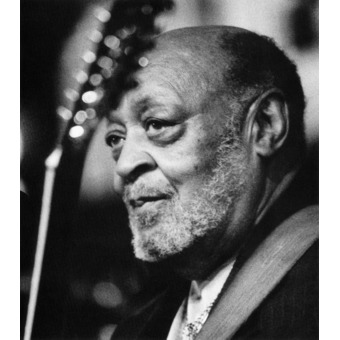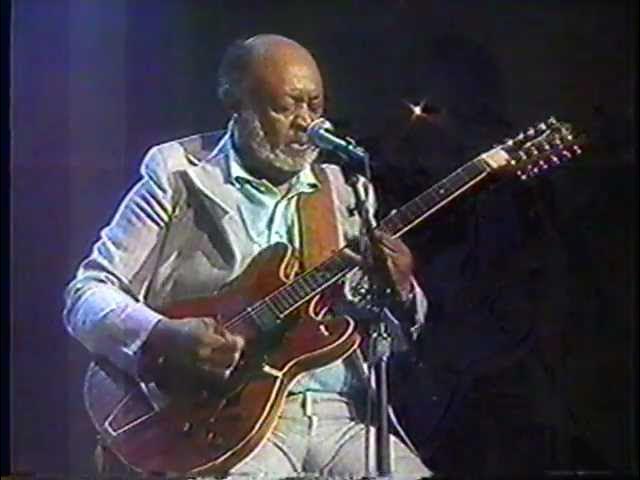Early Life and Musical Roots
Robert Lockwood Jr. was born on March 27, 1915, in Turkey Scratch, Arkansas, a small rural community near Marvell. He grew up surrounded by music in the Mississippi Delta, a region steeped in African American musical tradition. His early life was shaped by the vibrant sounds of gospel, ragtime, and the rural blues that filled juke joints and street corners.
Lockwood’s musical journey began in his youth when he picked up the guitar. His life changed dramatically when his mother began a relationship with none other than Robert Johnson, the legendary Delta bluesman. Johnson lived with the family for a time and became Lockwood’s mentor, teaching him guitar techniques and performance skills that would shape his career. Lockwood is the only known guitarist to have been directly taught by Robert Johnson.
A Bridge Between Eras
Lockwood’s style was unique—a hybrid of Johnson’s haunting Delta blues and a more polished, urban sensibility that would become central to postwar blues. By the time he was a teenager, Lockwood was performing professionally at house parties and on street corners, quickly gaining a reputation for his technical skill and expressive playing.
In the late 1930s and early 1940s, Lockwood made a name for himself in the vibrant blues scene of Helena, Arkansas, performing regularly on the influential radio program King Biscuit Time on KFFA Radio. This exposure introduced him to a wider audience and helped shape the future of Delta blues. He played alongside other blues legends like Sonny Boy Williamson II, further refining his style and deepening his reputation.
Recording Career and Chicago Blues
In the early 1940s, Lockwood moved north and became a crucial figure in the emerging Chicago blues scene. He recorded for major labels like Bluebird and Chess Records, cutting influential sides including “Take a Little Walk with Me” and “Little Boy Blue.” His recordings from this era showcased his refined guitar work, crisp vocals, and deep-rooted blues feel.
Lockwood collaborated with blues icons such as Muddy Waters, Little Walter, and Howlin’ Wolf, contributing to some of the most important recordings of the Chicago blues era. His versatile playing, which included both lead and rhythm guitar, made him a sought-after session musician.
A Move to Cleveland and Continued Influence
In the 1960s, Robert Lockwood Jr. moved to Cleveland, Ohio, where he would spend the rest of his life. In Cleveland, he became a mainstay of the local blues scene, performing regularly and mentoring younger musicians. Lockwood began experimenting with 12-string electric guitar, further distinguishing his sound and showcasing his innovative spirit.
Despite his deep roots in the traditional blues idiom, Lockwood was known for his open-mindedness and progressive musicianship. He could move effortlessly between Delta blues, jazz, and modern electric styles, making him a unique and enduring figure in American music.
Awards and Recognition
Robert Lockwood Jr.’s contributions to the blues were widely recognized in his later years. In 1995, he received a National Heritage Fellowship from the National Endowment for the Arts, the highest honor in the United States for traditional and folk artists. He was also inducted into the Blues Hall of Fame and received multiple W.C. Handy Blues Awards.
His 2000 album Delta Crossroads, a tribute to Robert Johnson, received critical acclaim and helped reintroduce his work to a new generation of blues fans.
Final Years and Legacy
Lockwood continued performing well into his 90s, often playing gigs well past midnight with a grace and energy that belied his age. He passed away on November 21, 2006, in Cleveland, Ohio, at the age of 91, after suffering a cerebral aneurysm.
Robert Lockwood Jr.’s legacy is immense. He was not only a vital link to the origin of Delta blues through his personal connection to Robert Johnson but also a forward-thinking artist who helped shape the evolution of electric blues. His playing remains a benchmark for blues guitarists, and his recordings are studied and revered by musicians and fans alike.
Conclusion
Robert Lockwood Jr. embodied the heart of the blues. He carried forward the tradition of his legendary mentor while also paving the way for modern blues expression. As both a torchbearer and a trailblazer, his impact on American music continues to resonate. Through his recordings, performances, and mentorship, he ensured that the blues would remain a living, breathing art form for generations to come.


No responses yet